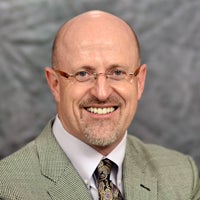KINGSTON, R.I. – Oct. 21, 2020 – In the early 1990s, Apple Computer extended domestic partner benefits to same-sex couples, locking the tech company in a fight with a Texas county that threatened to withdraw a tax break for a proposed Apple facility. It was national news, highlighting a clear inequity. A doctoral student in business administration at the University of California, Berkeley, Douglas Creed followed the story, fascinated.
“It was profound in a variety of ways,” says Creed, a professor of management in the College of Business at the University of Rhode Island since 2004. “I thought this is a great topic to study because it brings an issue of import into the management literature. It’s not an issue that would get a lot of attention because a lot of people wouldn’t touch it with a 10-foot pole. But it really raised an important theoretical question.”
In the years since, Creed has built a reputation for focusing on issues that affect marginalized people, researching workplace diversity, institutional change processes, social identity, and inclusion and equity. He’s also explored efforts to enact changes, such as those for LGBTQ workers to end discriminatory practices in the workplace.
In August, Creed and three researchers who together and separately have advanced scholarly research on LGBTQ issues were awarded the prestigious Joanne Martin Trailblazer Award from the Academy of Management, an international professional organization of scholars and management associations.
The award is presented biannually to scholars who open new lines of thinking or inquiry in organization and management theory (OMT). “A Trailblazer is a boundary-spanner and conversation starter, someone who extends and builds the OMT community by shepherding in new ideas and new scholarship, often in unconventional ways,” according to the award webpage.
Creed was honored along with colleagues Bryant Hudson, a professor of management at IÉSEG School of Management, Paris, France; Gerardo Okhuysen, a professor of management at the University of California, Irvine; and Maureen Scully, a professor of management at the University of Massachusetts, Boston, for “their scholarly efforts in starting and shaping our conversation about LGBT issues, stigma, shame, taboo, and power in organizational settings.”
“I actually had never heard of the award until I received it,” says Creed, of Boston, a past chair of the Gender and Diversity in Organizations Division of the Academy of Management. “It was funny because none of us had and it had been around for perhaps 10 years. So, we Googled it and our first reaction was, ‘Wow, look at who’s won this award.’ It was a parade of luminaries. We were like, ‘How did we get this?’”
The award came with a degree of vindication. Three of the four recipients weren’t offered tenure in their early jobs in higher education, and Creed says he thinks their focus on gay and lesbian issues was a factor in some cases.
Creed has coauthored research papers with each of his fellow recipients, including teaming with Scully on the research into domestic partner benefits. “Gerardo, Bryant and I were among the first out members of the Academy of Management, and we created opportunities for LGBTQ scholars,” he says. “We also created a network within the academy back in the ‘90s. Bryant and Gerardo started their own research, and in the ‘teens we started writing together. So, it’s been a case where we were breaking ground simultaneously and then we intersected.”
Organization and management theory, Creed says, is a combination of sociology, psychology and political science. There’s a belief within OMT that examining extreme cases can be more revelatory of the underlying dynamics involved. “It’s fair to say that I’ve done that,” he says. “I’ve taken extreme cases of marginalization and inequity and looked at the micropolitics of organizational change.”
When Creed started college back in the mid 1970s, he never anticipated a career in business. In 1979, he received a bachelor’s degree in English, Magna Cum Laude, from Yale College and went on to earn a master’s degree in religion at Yale Divinity School. He went into banking in the mid-1980s before earning an MBA and Ph.D. from the University of California, Berkeley.
“My early interests are reflected in my research,” he says. “I use language and texts, and I interview people and then look carefully at what they said. For me, divinity school was a mix of concern for social justice issues and a life of faith.”
Among his research projects that have received the most attention over the years has been a 2010 paper, “Being the Change,” that explores LGBTQ people pursuing ordination in Protestant denominations. He interviewed some who were openly gay and others who weren’t. “I was looking at them as organizational and institutional change agents working under particularly hostile conditions in some cases,” he says. “It allowed me to think about how identity figures in change processes and what kind of identity work a change agent has to do.”
“It was a social justice issue in my mind,” he adds. “It’s based on interview data and the people I interviewed were just such amazing people. I get goosebumps when I read it again and read their words.”
Creed is exploring city resilience strategies and how inequality and systemic racism factor into those strategies. He stared the research in 2016 while serving as a Fulbright Visiting Professor at Vienna University of Economics and Business, in Austria.
“It’s really quite timely now,” he says. “I’ve been looking at American cities’ resilience strategies, and there’s probably no American city that doesn’t have the enduring effects of redlining affecting the well-being of citizens in the city. And that undermines resilience.”

